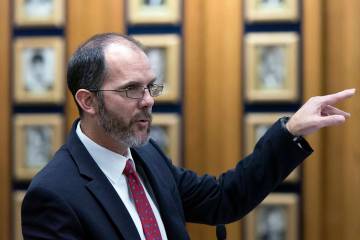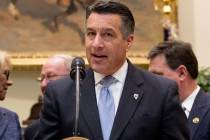Native Americans fight bill that would cut funding of Nevada’s historic Stewart school
CARSON CITY — Native Americans oppose a bill in the Nevada Legislature that would divert funds earmarked for the preservation of the historic Stewart Indian boarding school in the capital.
Assembly Bill 285 would change the law that requires 100 percent of the proceeds of the sale of two state-owned parcels of land in Carson City to be used for the preservation of the buildings and grounds of the school.
The sale of the land, a former state youth camp, was authorized by lawmakers in 2015.
Several of the more than 60 stone structures on the 110-acre Stewart campus, many built by Hopi stone masons, are in disrepair, and there are concerns about their seismic stability. The federal government opened the school in 1890 and operated it until it was shut down in 1980.
More than 30,000 children, mainly from Nevada, Arizona and New Mexico, attended the school. At first the children were forcibly taken to the school. They learned reading, writing and arithmetic, but classes also focused on vocational training, such as ranching, farming, mechanics and carpentry for boys and cooking, sewing and practical nursing for girls.
The measure, heard Wednesday by the Assembly Government Affairs Committee, would divert 50 percent of the proceeds of the sale of the parcels on Old Clear Creek Road in Carson City to improve road access to the remaining parcels.
MORE MONEY
Carson City resident Janette Bloom, who resides on Clear Creek Road, requested the bill and said the intent of the measure is to increase the money that could be used to preserve the endangered school buildings.
“This bill is not designed to harm any effort to preserve the Stewart Indian School,” she said.
Assemblyman Al Kramer, R-Carson City, said the portion of the property that could be sold would bring in about $1 million with the road in its current condition. It would likely bring in $4.2 million with road improvements, he said.
The state Department of Transportation has estimated the 3 miles of road repairs would cost about $1.5 million. The road dead ends on the west side of the city.
Although he sponsored the bill, Kramer said he will abstain on debating or voting on the measure, because he owns the property on the road.
OPPOSITION
Several Native Americans with ties to the school said all money from the sales should go to the school.
A statement from Sherry Rupert, executive director of the Nevada Indian Commission, was read into the record at the hearing in opposition to the bill. The commission offices are on the Stewart campus.
Kostan Lathouris, a member of the Chemehuevi Tribe, testified against the bill from Las Vegas, saying he is related to many former students, including his grandmother.
Lathouris, who serves on the school’s preservation council, said it serves as a testament to the native spirit. Cutting the funding in half would be detrimental to its preservation, he said.
Aletha Tom, a member of the Southern Paiute Tribe in Moapa, said that, as an alumna from the school, she has to continue to fight for its preservation.
“The school is not just a school; it is not just a boarding school. It has a lot of meaning and history to it,” she said.
Terri McBride, a Carson City anthropologist who volunteers at the school, said the bill looks like “a private property owners group grabbing state money to improve their property values.”
Owners in the canyon got a public access trail head closed several years ago, and now they want state funds for the road, she said.
Contact Sean Whaley at swhaley@reviewjournal.com or 775-461-3820. Follow @seanw801 on Twitter.
STEWART INDIAN SCHOOL HISTORIC MARKER
First known as the Carson Indian Training School, Stewart Indian School, operated by the U.S. Bureau of Indian Affairs, provided vocational training and academic education for American Indian students from throughout the West for nearly a century.
W.D.C. Gibson, the first superintendent, renamed the boarding school in honor of U.S. Senator William Morris Stewart of Nevada, the principal figure in obtaining congressional authorization and funding for the institution.
In the early 1920s Superintendent Frederick Snyder initiated a stone building program. Students worked with stone masons, some of American Indian ancestry, to construct the handsome stone structures that still grace the grounds.
Stewart Indian School was listed on the National Register of Historic Places in 1985.

































